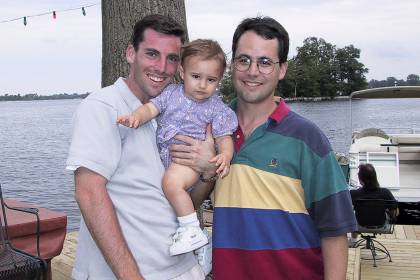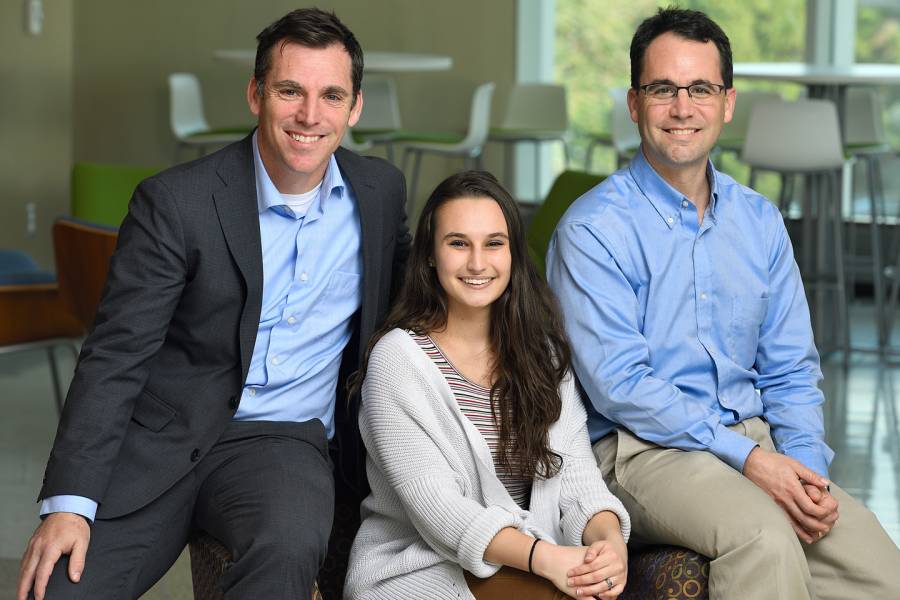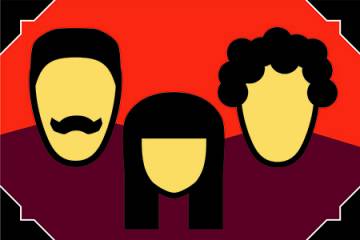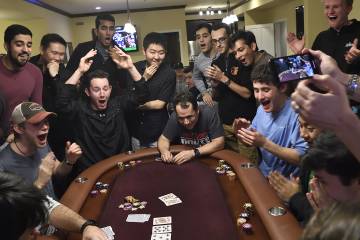Editor's note: This interview was conducted on the Homewood campus before the coronavirus outbreak.
It has happened only once since JHU computer science Professor Avi Rubin has been on the Homewood campus. Someone called out to him near Shriver Hall and, though the voice was familiar, he wasn't sure who had hailed him.
It was his daughter, Elana M. Rubin, a junior in the Writing Seminars and a member of a Jewish a cappella group on campus called Ketzev. She might just as easily have spied her uncle Yaacov Rubin, a JHU senior director of finance and administration.
First, Avi and his wife, Ann, landed here in 2003 "without knowing a single person in Maryland," he says; then the Rubins' parents—retired Vanderbilt University Professors Abba [Shakespeare scholar] and Carol [mechanical engineering]—moved across the street from their oldest child.
And last year Yaacov followed with his family from Ann Arbor, Michigan, where he worked for the Ford Motor Co. and he and Avi had attended the University of Michigan. Including his parents; Avi; and his sisters, Tova and Rachel, "I'm the only one without a PhD," Yaacov laughs.
Recently, the professor of computer science, the campus administrator, and the harmonizing undergraduate all met in Avi's Malone Building office to talk about, as Sly Stone once put it, the "family affair" that is the Rubin experience at Hopkins.
As you will see, they're quite the clever deck of cards.
Avi, you paved the way for the family at Homewood. What brought you to Johns Hopkins?
Avi: I was working for AT&T Labs in New Jersey and had decided to leave in 2003. Hopkins had just formed the Information Security Institute, and my offer included an appointment as technical director. I was very excited for the opportunity to help build the first program like that in the country. I became a full professor in 2004.
We also had a three-and-a-half-year-old [Elana] and five-month-old twins [Benny and Tamara] and wanted to send our kids to Jewish day school. Baltimore offered the best options—and the Chesapeake Bay. I'm a big boater.
What exactly do you do?
Avi: I specialize in cybersecurity, applied cryptography, and what's called "the internet of things," like smart refrigerators and smart thermostats.
Elana, you were that three-and-a-half-year-old and now you're pursuing the craft of writing in the Writing Seminars?
Elana: When my grandparents moved to Baltimore, I used to stay at their house late into the night and discuss poetry with my grandfather. I also gave him a lot of the poems and stories I used to write, and he would give me comments.
I went to the Carver School for the Arts in high school, and now I'm studying fiction and poetry but leaning toward fiction. I'm beginning to think that writers experience the world more richly, maybe [have] a tendency to experience more pain than other people.

Image caption: Yaacov, Elana, and Avi in Michigan, June 2000
You recently heard National Book Award winner [and Vietnam War veteran] Tim O'Brien give a reading in Remsen Hall.
Elana: It was even more amazing than I thought it would be. He mentioned how he hated being called a "war writer," and it [resonated] because I have always worried about being defined as a "Jewish writer," that I'll be expected to only write about Jewish topics. O'Brien reminded us to tell our own stories, to trust our imaginations over those of our literary predecessors. It was advice I needed to hear.
So, Yaacov, you followed your big brother to Baltimore?
Yaacov: I'd been in the corporate environment for 20 years before coming to Hopkins. I appreciate the mission and culture I'm finding here—people are truly behind it in a sincere way. It's [important] for me to work for a place that is making a difference in the world as opposed to a place trying to make cool trucks.
Have you had any impromptu family reunions on campus like Elana and her dad?
Yaacov: Nothing unplanned. I lead a lot of universitywide initiatives, and one of them is called the IT Investment Working Group. We convene a few times a year to decide which IT projects we'll invest in. We have each stakeholder for a project come in and present their case, look at funding, make recommendations. It was my first opportunity to do Hopkins work with Avi.
And?
Yaacov: I asked him if he wanted to join the project. He hates being on more committees, but he did it. It was pretty neat when I went around the room [presenting] all the members and introduced him as my brother.
It's obvious how important Jewish identity is to each of you. Yaacov said the family falls somewhere between Conservative and Orthodox in observance, and when he and Avi were kids, the family lived in Israel for about five years.
[Everyone nods.]
But the word on campus is that Avi's true religion might be poker ...
[Avi blushes. Everyone laughs.]
Elana: He keeps spreadsheets!
Yaacov: He has a boat called River BET!
Avi: [Laughs, gently protests.] It's the initials of my children—Benny, Elana, and Tamara!
It was you, Yaacov, who led your brother to the gaming table?
Yaacov: Our parents always played bridge. Dad and I play pinochle, poker, a game called casino, and gin all the time together. I played online poker for about 15 years before moving here and was relatively adept. When Avi said he'd played in a home game, I asked him how much he knew about poker.
Avi: I thought I knew a lot.
Yaacov: But he only talked about the hands he was getting. I asked how many people were in the game. What position was he at the table. He wasn't sure. I told him he didn't know enough about poker to know what he didn't know.
Avi: He gave me a book, Harrington on Hold 'em by Dan Harrington.
Yaacov: And then I started going to his home games. I didn't have a poker life in Ann Arbor, but I have a whole new poker life here. It's how I've met a lot of people in Baltimore. Sometimes Avi and I end up at the same table and we hope not to knock each other out.
Yet, you play to win ...
Yaacov: It's bad poker not to take someone out of the game when you have the chance.
Avi, during Intersession in January, you taught Introduction to the Theory and Practice of Poker, and more than 200 students signed up. As a number-crunching scientist, what percentage of the game do you believe to be skill versus chance?
Avi: I get asked that all the time. I don't see it as gambling because a good player can be a steady winner, unlike games like craps and blackjack. I'd say, in general, poker is 70% skill.
Elana, you said your boyfriend took your father's Theory of Poker course. Do you play?
Elana: I respect the game, but it's not for me.
Posted in News+Info
Tagged family snapshots










